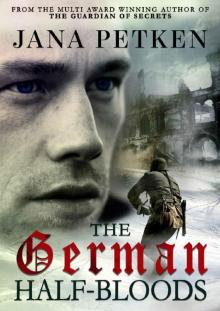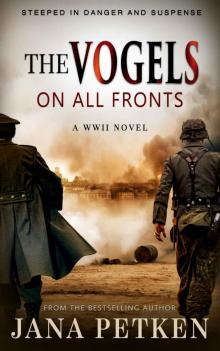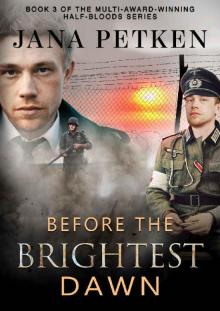- Home
- Jana Petken
The German Half-Bloods (The Half-Bloods Trilogy Book 1) Page 20
The German Half-Bloods (The Half-Bloods Trilogy Book 1) Read online
Page 20
Paul, still traumatised from what he’d seen earlier that day, deduced that the new gas would be used in conjunction with lethal injections, and would possibly supersede the needle altogether. It stood to reason, he thought, the gas killed larger numbers of people in one fell swoop. His father wasn’t stupid. He had to, now, suspect that Zyklon B was to be used as a chemical weapon.
“You can’t do this, Papa,” Paul said, softening his tone.
Dieter stood, casting aside his rarely exposed vulnerability for his customary austere mask. “You need to explain yourself to your mother and me about what that Jew is doing in my home, and where you’ve been all day. And don’t ever forget, boy, I’m your father. I can do what I bloody well like.”
******
In the kitchen, Paul countered his father’s demands that Judith should leave his house immediately, by appealing to his mother’s better nature. Laura had also pleaded Judith’s case to her husband, but it seemed there was no swaying Dieter when his mind was made up.
“If she wasn’t on some damned list I would let her stay, but she is, and the SS will look for her everywhere,” Dieter reiterated. “I’m sorry, Laura, but she can’t stay here. I’m not putting you and Paul in danger. You saw that Leitner fellow vying for blood, he’ll make a very dangerous enemy if we’re not careful.”
Dieter then turned his attention to Paul. “Did they see you outside, Paul?”
“No, I was cautious. I wouldn’t want your reputation to be tarnished on my account,” Paul grunted sarcastically.
“Don’t be cheeky to your father,” Laura snapped. “And you, Dieter, don’t be uncharitable. If Paul says it’s dangerous for Judith to go home to her flat, we should believe him. What would you do if it was our Hannah in trouble?”
“Hannah’s not a Jew, or a waif and stray, she’s our daughter.”
Judith, who’d been hugging a cup of tea while cowering in a chair at the kitchen table, finally spoke. “I understand, Herr Vogel. I’m a Jew, and you’ll be in trouble with the authorities if you help me.” She stood, as though trying to maintain some semblance of dignity. “Doctor Vogel, will you please take me to the outskirts of Berlin? I’ll walk to wherever from there.”
“No. Please, Judith...”
“I’ve made my mind up,” Judith interrupted. “I can see your parents are afraid, and I’m not surprised; we Jews seem to have this effect on people nowadays. But I’m not scared of Nazi hospitals or fences around my home, or the bullies who take my food and threaten to report me. Why should I be afraid in my own country? I’m more German than you and your mother, who’s not a German at all. I’m just as good as any other person who pays rent and taxes. I’ve got nice things in my house worth money. I’ve only got twenty marks and fifteen pfennigs in my pocket now, but I had much more than that before the Gestapo stole what they wanted when they took my father away. I’ve never been in trouble with the police or owed a pfennig to anyone, and I don’t want your family to fight for me, or over me. I’d rather take my chances in another country where my religion and race doesn’t matter to anyone.”
“But how can a girl like you get to another country?” Laura was appalled. “You won’t get far if you don’t have money or documents, other than Jewish ones...”
“I don’t care,” Judith spat. “I hate this Berlin, and I hate the people that live in it!”
“Please, calm down...”
“You calm down!” Judith gripped the edges of her yellow star, growling as she ripped it off her coat. “I’m not wearing this stupid thing, either. A dirty yellow patch doesn’t define me. I’m as good as any of you.” She flung it on the floor. “You can have your Führer and your Gestapo and all the other bigots doing the Nazis’ bidding, and you can have that badge as well!” Then breathless, she stomped to the door and told Paul, “If you don’t take me out of the city, I’ll walk.”
Paul glanced at his parents. His mother was crying, and his astonished father looked as though he was wrestling with a momentous decision.
“Judith, I can’t let you leave,” Paul reached for her arm.
Laura sobbed. “Paul’s right. Please, don’t go, dear. We’ll think of something.” Then, she glared at Dieter. “Are you forgetting my circumstances ... about what could happen to me if they turned on this family?”
Dieter let out a defeated sigh. “Judith, is it?” he asked.
Judith, standing in the doorway, responded with an arrogant nod. “Yes, my name is Judith Weber, and I’m not going to beg you for anything, so don’t think I am.”
Dieter held her flashing eyes. “No. I don’t suppose you’re the begging type, are you? In which case, I’ll invite you to stay with us for a few days while we think of something … after that, I don’t know ... I don’t know what’s going on around here anymore.”
Chapter twenty-Eight
Wilmot Vogel
Munich, Germany.
June 1940
He was guilty, guilty, and going to die. Wilmot crossed his arms in defiance as he was pushed into a cell in Munich’s prison. He wasn’t surprised by the hastily-arrived-at verdict against him. He’d been caught red-handed pointing a gun at Franz, and still shouting Up yours, bastard! when the officers’ jeeps had screeched to a stop next to the dead bodies of the Jews.
Was Franz dead or alive? He’d asked his jailers that question every time they’d come with food or to move him somewhere else, but they’d never answered him. They liked to tease him by leaving him to wonder if he’d murdered a fellow soldier, for if Franz was dead, they’d shoot him or hang him. But, if by some miracle and lousy shooting on his part, he’d only wounded the man, he could end up with a prison sentence, and his father being the important person he was, might be able to get him out before things got too rough. He could think of no great scenarios, but staying in a concentration camp for a little while was infinitely better than death.
“I’m Christoph Krüger. What are you in for?” the SS Stormtrooper sharing Wilmot’s cell asked.
Wilmot studied the scared young man before answering. “I’m Wilmot Vogel. People call me Willie. I can’t be sure what I’m in here for, but I think I committed a murder. I couldn’t even tell you why I shot Franz, and I still don’t know if I killed him. Nobody will tell me.”
“Bloody hell, that’s bad.” Christoph shook of his head. “They’ll throw the book at you for that. Are you getting the death penalty?”
Wilmot shuddered. “Who knows? I’ve spent two days travelling by train and truck, held in transit cells in Warsaw and now here in Munich, and I’m still none the wiser. I suppose they’ll tell me soon enough. What did you do?”
“Nothing compared to you. I left my post to have a piss, and when I got back, a Gestapo Major was standing at my checkpoint. You’d have thought I’d walked away leaving the Bank of Germany’s door open by the way he reacted.”
“That’s bad luck.”
“I know. I should have got off with a warning. I only went behind a bush for Christ’s sake.”
As much as Wilmot was grateful for Christoph’s company, he was far too scared to think about holding a proper conversation or to even respond to the boy’s questions. He felt sick, and if his heart beat any faster it would jump out of his chest and make off down the road. It had been two hours since the final verdict had been delivered. How long was it going to take them to pass sentence?
“Does your family know what you’ve done and where you are?” Christoph asked.
“I don’t know. I hope not. It’d be better if they thought I was fighting in the war like a good soldier. God only knows what they’ll say if I get shot by firing squad.”
Christoph giggled, a childish squeaky little sound. “Ach, look on the bright side, you’ll not be around to find out.”
It was dark by the time Wilmot was led back to the courtroom; a room like any other room in a house but with the necessary tables and chairs to hold a military trial. He was told to stand to attention until the SS Obersturmbannführer
and the two other officers with him had taken their seats.
Wilmot’s eyes were full of grit from the dust in the cell. They were red and bright with tears, but he was not going to cry here, not even if they told him he was going to die.
For a while the three officers appeared to be debating something. Christ, they’d had six hours to reach a decision, yet they were still talking about him.
“Rifleman Vogel. Your victim survived, but only because you missed a vital organ by hitting him in the arm.”
Wilmot gasped with relief, the promise of life coursing through him. They wouldn’t shoot him, not now, not tomorrow. Franz was alive, and the bastards hadn’t told him. He scowled at the Obersturmbannführer, causing one of the other judges, a Standartenführer to ask, “Do you have something to say, Vogel?”
“No, sir, nothing ... well yes, sir, I do. I wish someone had told me that Franz was alive. It’s been a horrible time not knowing if I’d killed a fellow soldier in a fit of temper. I regret my actions. Shooting him was the most stupid and unnecessary thing I’ve ever done.” Wilmot noticed that they seemed to want him to talk, so he took advantage of that opportunity. “I suppose I was unnerved by everything that had happened. I went straight from basic training camp into an invasion. I fought hard, but I don’t think I was prepared for the carnage. And when Franz, that would be, Rifleman Bachmeier, began shouting at me, calling me a soppy woman, I lost my mind for a minute. I don’t remember drawing my gun, or shooting at him … but I’m very, very sorry I did.”
“You will have plenty of time to ask for forgiveness,” the Obersturmbannführer said.
“Will you let me prove myself to you?” Wilmot blurted out. “Send me to the front lines.
I’ll fight for you, and I’ll never fire my gun at another German soldier for as long as I live. I’ll make you proud. You have my word.”
“We don’t want men like you fighting for the Fatherland,” the Obersturmbannführer smirked. “You’re sentenced to an indefinite period in Dachau concentration camp. Now, get out of my sight, you’re a disgrace to your uniform.”
Wilmot bowed his head, embarrassed now by his feeble outburst. The guards led him out of the room and down a corridor towards the back of the building. His heart pounded with terror. He was more afraid now than he’d been during the first days of the Polish invasion, when he’d been scared, but also excited – Dachau, that was bad. He’d heard stories about the place, how no one got out of it once they went in – he now believed the tales about people never being told how long their sentences were. He supposed that in time of war, lawyers and judges, and military officers had plenty of other things to keep them occupied. Indefinite? Another way of saying forever? The adage, ‘I’ll put you in there and throw away the key,’ came to mind.
Filled with helpless dread, Wilmot dragged his feet to the truck parked outside the building. His life was over as he knew it. He’d heard other things about the concentration camps: prisoners were given hard labour, thrashed like mules, and had only just enough food to keep them alive. They were squashed like sardines into dormitories with bunks three high with not enough room to stretch out. He was taller than the average German, who were by no means short; he’d need plenty of leg room. People were bound to die in those places, he thought. It stood to reason that only the very fit and healthy could endure a long sentence under those terrible conditions.
Christoph and another two SS prisoners were already seated on a bench in the back of the truck. Wilmot nodded to them; their faces were ashen. Christoph, the youngest of them, was only eighteen. He was crying now, doing what Wilmot wanted to do but wouldn’t. He had too much pride to cry like a girl in front of other men who might bully him once he was a prisoner. He’d get to that when he was alone somewhere, if he would ever be alone again.
“You didn’t die then,” Christoph said, as though disappointed.
“No, and neither did Franz, the man I shot. I’m going to Dachau.”
“Me too,” Christoph grumbled. “I’m not happy with me getting the same sentence as you. It doesn’t seem fair that we’ve been given an equal punishment when all I did was piss behind a bush. That’s not right at all. I’ll see about that when we get there.”
******
Dachau was situated only twelve kilometres from Munich. Throughout the journey Wilmot stared at the truck’s canopy opposite him, thinking about what he’d done, his shame and regret, his mother’s tears and what his father would say when he heard. The shame didn’t lie as heavily on him as the regret. He’d ruined his life; he’d admitted that to the officers in the court. But, he couldn’t seem to prepare his mind for what was to come, or even visualise the place he was going to. He was nineteen years old and looking at a future of hard labour and incarceration. How the hell was he supposed to picture that?
They’d probably get him to lift and lay things all day, for he was young and strong, like a lot of the poor sods he’d seen in Warsaw fixing the roads. He’d laughed at the Poles’ painful struggles pushing heavy stones in wheelbarrows over rough ground, and he’d even had a good giggle when they’d got hit with batons for not moving fast enough. He’d be in a worse state than those poor bastards; at least they got to go home at the end of their shifts.
Christoph, sitting beside Wilmot, no longer seemed resentful. Instead he appeared to have accepted his fate with stony silence. He’d not uttered a word since leaving the city.
When they arrived at Dachau’s entrance, the truck stopped at the gates to let the prisoners out. Wilmot looked up at the sign across the top of the gate – Arbeit Macht Frei – work brings freedom. He shook his head. Bloody stupid saying that was. How was work supposed to give a man freedom when he was locked up in a prison camp? That was just pouring salt on the wound.
Inside the camp, the men were marched towards the prison on the east side of the compound where there were only two buildings. En route, Wilmot saw some of the internees wearing grey and white striped pyjamas. He hoped they wouldn’t make him wear them. They looked pathetic, like children with skinny bodies and old wrinkled faces. Would he eventually look like that?
Through barbed wire fences, he spotted men with shaven heads exposed to the light snowfall that had just begun. They were picking up wood from an enormous pile, putting the logs into wheelbarrows until a train of them headed towards a building through another gated fence. Were they all Jews? He didn’t think so. He could spot a Kike a mile off. They always looked terrified, kept their heads down, and were quiet like demure girls. Wilmot supposed they didn’t look anyone in the eye in the hope they’d not be noticed and kicked around like a football or shot for gawking. And where were the women? He hadn’t seen any. Maybe their barracks weren’t visible from this part of the camp.
As he marched, he thought about the Jews. He’d been twelve when real Germans began singling them out as being an inferior race. He supposed he’d grown to accept that they were sub-human. He’d trusted his teacher at school who had taught him that two and two made four, and he’d believed the Nazi Party’s and Adolph Hitler’s theory that Jews were bad people ruining Germany. His mother had once told him that if one heard the same rhetoric enough times it would become an indelible fact, and the truth would then become the lie. Edicts from governments, she’d also warned him, were rarely based on reality, but on well-practised deceit. Strange, he thought, spying an old man fall over in the snow, before Hitler came to power, he and his siblings had paid little attention to Jewish Germans – they had seemed just like him.
Inside the wing of a bunker where they would now live, the SS prisoners deposited their meagre belongings on the vacant bunks. Wilmot had a rolled-up blanket, a toothbrush and two pairs of underpants to his name. He took a bottom bunk. Even at training camp, he’d preferred the bed nearest the floor. It was warmer than the more open top bunks.
Fifteen SS prisoners were already in residence in the dorm. They were still wearing either the bottom or top half of their uniforms with the other half bein
g the striped pyjamas. He was glad to see that they were going to stay together as a unit. Maybe, they wouldn’t have to sleep with the Jews, or mix with them at all? That’d be a bonus, seeing as how they were the reason he was in this mess, and he didn’t know what he’d do if he got hold of one.
A guard marched in, shouted Heil Hitler and gave the obligatory Nazi salute. Then he stood with his hands on his hips in front of the men, staring at each one until Wilmot and his fellow prisoners returned the salute.
The soldier who arrived next wore the insignia of an Oberscharführer, Wehrmacht Feldwebel on his uniform shoulder. Wilmot presumed that he was the man in charge, being a senior platoon leader and looking like Hitler himself with the high held head and a thin little moustache like a toothbrush atop his skinny top lip. Wilmot stood as straight as he could to show the Oberscharführer the respect he expected. If he were asked to kiss the man’s feet he’d do so to keep on the right side of him.
“You lot are dogs to us – traitors and scum,” the Oberscharführer said, shattering Wilmot’s hopes for an easy time of it. “I’m going to make your lives a misery every single minute of every day you’re here. Do you know why?”
“No, sir,” voices mumbled.
“Well, you should know. You not only betrayed your units, your fellow soldiers and your oath of loyalty, you also spat in the face of the Fatherland. If I see you complaining or dissenting, I will smack you so hard you’ll be spitting teeth for a fortnight. If I notice you feeling sorry for yourselves, I’ll give you twice as much work and half your ration of food. And you, new men, don’t expect to make friends with the guards just because you’re wearing the same uniform as us. We shit on you. Men are dying for the Fatherland while you’re sitting out the war like lazy, over-the-hill grannies, so don’t think for a minute that we’re going to make it easy for you.” He swept his index finger around the room. “You lot make us feel sick to our stomachs, and we’re going to make you regret you’re alive.”

 Blood Moon
Blood Moon The Guardian of Secrets and Her Deathly Pact
The Guardian of Secrets and Her Deathly Pact Dark Shadows
Dark Shadows The German Half-Bloods (The Half-Bloods Trilogy Book 1)
The German Half-Bloods (The Half-Bloods Trilogy Book 1) Swearing Allegiance (The Carmody Saga Book 1)
Swearing Allegiance (The Carmody Saga Book 1) The Errant Flock
The Errant Flock The Vogels: On All Fronts (The Half-Bloods Trilogy Book 2)
The Vogels: On All Fronts (The Half-Bloods Trilogy Book 2) The Guardian of Secrets
The Guardian of Secrets Before The Brightest Dawn (The Half-Bloods Trilogy Book 3)
Before The Brightest Dawn (The Half-Bloods Trilogy Book 3) Blood Moon (The Mercy Carver Series Book 2)
Blood Moon (The Mercy Carver Series Book 2) Dark Shadows (The Mercy Carver Series Book 1)
Dark Shadows (The Mercy Carver Series Book 1)